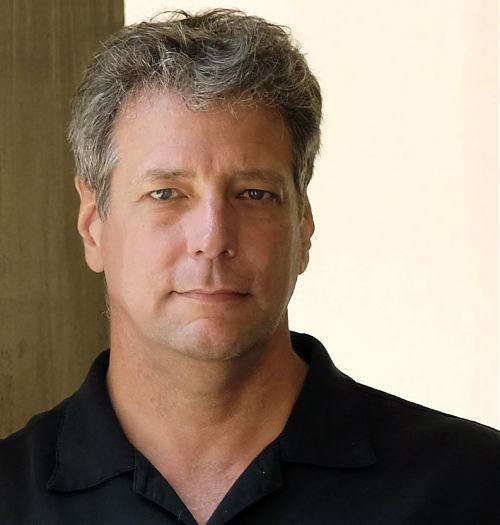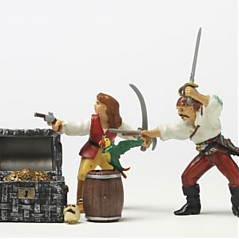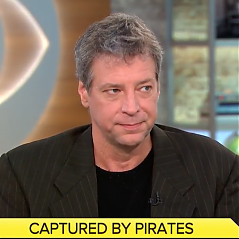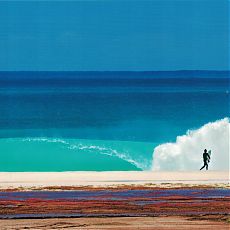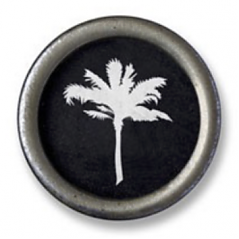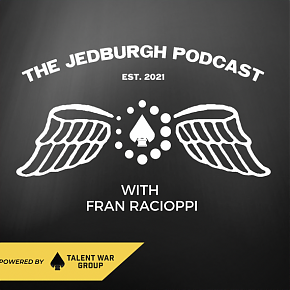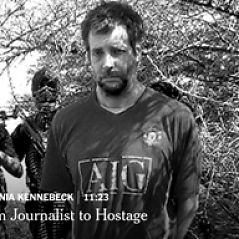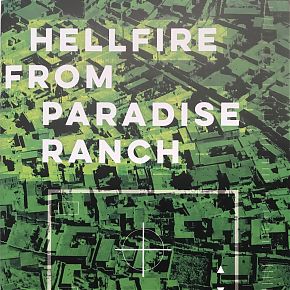Somalis and Tolerance
“Putin, bura’ad”
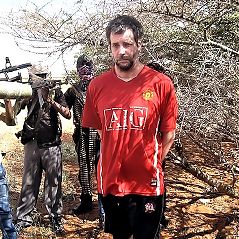
August 2018
The Globe & Mail
I had been held hostage by Somali pirates for 25 months when Russian President Vladimir Putin invaded Ukraine. I remember one of my guards listening to news about the annexation of Crimea on the Somali BBC. He lifted his thumb and said, “Putin, OK!” with a mischievous grin.
That morning, I had listened to the English service report that Russia’s Black Sea fleet was blockading Sevastopol’s harbor, effectively holding a third of the Ukrainian navy hostage.
“Putin bura’ad,” I said sullenly. Putin is a pirate.
The guard laughed. My pirates, it turned out, admired Mr. Putin as a strongman – someone who used violence at will, who refused to put up with much guff from the hypocritical Western liberal order.
A pirate gang kidnapped me in January, 2012, while I researched a book in central Somalia. I had followed a trial of 10 Somali pirates in Hamburg, Germany, and the clash between a liberal modern state and an archaic, almost zombie-like crime – risen from the dead after two centuries of relative quiet on the high seas – fascinated me.
I almost paid with my life for this curiosity, and I wouldn’t do it again. But there were surprising moments of political comedy during my 32 months as a hostage. Some pirates wanted to emigrate to the West – take their share of my ransom and move to Europe. Farhaan, a fat and jolly-seeming Somali with dead eyes who made vanity portraits of himself with his phone, showed me a rudimentary collage of his own face next to a line of small but colourful cars on the Autobahn. I made my home in Berlin at the time, so by showing me the image, I think he was looking for (perhaps ironic) common ground.
“What is that?” I asked.
“It is Germany.”
“Yes, but why?”
“It is me, just dreaming.”
The pirates’ English was poor, their German nonexistent, but they had an impression of Nordic countries as safe destinations for Muslim migrants, with lax deportation policies and generous welfare. They knew about “Germany,” “Sweden” and “Holland.” But they didn’t know where they were. They asked me to draw maps to help improve their European geography.
I came home from Somalia in September, 2014, before the groundswell of migration across the Mediterranean reached its peak a year later. It would have been easy to line up with Donald Trump or PEGIDA (Patriotic Europeans Against the Islamisation of the West) or some other reactionary movements that protested the “Muslim invasion” of refugees in Europe from war-torn places such as Syria, Eritrea and, in fact, Somalia. I didn’t want to live in Berlin with any of my ex-guards, obviously, and I did think that Western progressives had a weird habit of underestimating Islam as a force for separation among Muslims just arriving in strange new (industrialized, Christian) countries.
But the fact is that most Somalis who leave for the West aren’t pirates or terrorists. They’re trying to get away from pirates and terrorism – from all the consequences of clan warfare that still wastes and beggars their country. I know enough other Somalis – journalists, translators, businessmen in Nairobi and New York – to distinguish between hard-working immigrants and the men who held me hostage.
In the country where I was born, raised and once again live — the United States — the ruling party has declared a cultural war against immigrants, especially those from Muslim countries (including Somalia). This partisan project is a deliberate attack on classical liberalism, the Enlightenment tradition that evolved into both branches of American politics: traditional rock-ribbed conservatism as well as the progressive Left. Both branches have powerful enemies, from Moscow to the Horn of Africa. But the great irony to me is that my pirates’ dazzling lies, their bully-boy behavior and naked will to power — their incompetence at treating outsiders and hostages like human beings — is echoed in the rise of Mr. Trump.
I do think immigrants from war-torn countries ought to be background-checked. But it’s a nasty self-deception, not to mention immature, to treat every Somali as a pirate or hold every Muslim responsible for intolerant verses of the Koran.
Oddly enough, I found new depth for this tolerance in Somalia. I learned to forgive, precisely because I came close to murder. I had to talk myself down, more than once, from the temptation to pick up a pirate Kalashnikov and start shooting. It would have been a suicidal act because the pirates outnumbered me. The heroic pilot from Kenya who flew me out — after a ransom payment, in the fall of 2014 — had elite training as an SAS operator. He’d served as a member of the British special forces, and I saw him again recently in Nairobi. He suggested I had survived because I had not been trained like him. “The temptation would have been strong for someone like me. We’re wired to pick up the gun,” he admitted. “But so many things can go wrong.”
Gunfire would have been suicidal for another reason: Somalia suffers from clan violence because the temptation to dissociate yourself from whole groups of other people is so powerful. The United States will go the same way if it’s not careful. Human beings like to think they have nothing to do with certain other human beings. That’s a scurrilous lie, a cliché that needs some experience and discipline to see through; but forgiveness will teach you more about good and evil than a thousand fervent preachers of hate, whether they come from a windswept Muslim village or a glittering Western capital.
“If only there were evil people somewhere insidiously committing evil deeds,” Aleksandr Solzhenitsyn wrote in The Gulag Archipelago, arriving at a similar conclusion from his time in a Soviet prison, “and it were necessary only to separate them from the rest of us and destroy them. But the line dividing good and evil cuts through the heart of every human being.”
Michael Scott Moore
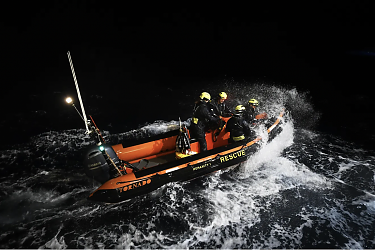
Rafts of the Medusa
Why every day on the Mediterranean is a new scandal for Europe. For both Foreign Policy and Die Zeit.
California’s Attempt at Land Reparations
How land seized from a Black family 100 years ago may be returned. The Bruce’s Beach story from a hometown angle, for The New Yorker
Day of the Oprichnik, 16 Years Later
The novelist Sorokin, the president Putin, his man Dugin, and the war in Ukraine. For n + 1.

The Rushdie Narrative
Knife and the crumbling ground beneath free speech
There Must Be Some Way Out of Here
An essay on Bob Dylan, “All Along the Watchtower,” and Somali pirate captivity.
That Mystic Shit
The life of Lou Reed in two biographies

Cambodian Seafarers Talk About Pirates
Mike visits Cambodia for The New Yorker to talk about a harrowing shared experience in Somalia
The Muslim Burial
Cambodian hostages remember digging a grave for one of their own. A sequel chapter to The Desert and the Sea
The Real Pirates of the Caribbean
Adventure journalism in Southern California. A travel essay for The Paris Review.

Antifa Dust
An essay on anti-fascism in Europe and the U.S., for the Los Angeles Review of Books
Was Hitler a Man of the Left?
A book that helped Republicans in America lose their damn minds.
Ghosts of Dresden
The Allied firebombing of Dresden in 1945 destroyed the baroque center of what Pfc. Kurt Vonnegut called, in a letter home from Germany, “possibly the world’s most beautiful city.”
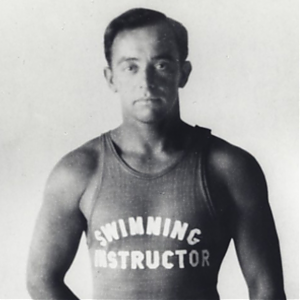
George Freeth, Biographed
The first academic treatment of America’s surf pioneer. Also, was Freeth gay?
It’s Called Soccer
Americans live on what amounts to an enormous island, defended on two shores by the sea, and we’ve evolved a few marsupial traditions that nobody else understands.
Tilting at Turbines (in the Severn River)
The morning was clear and cold, with frost on the church steeple and the cemetery grass. I had a quick English breakfast at a white-cloth table, in my wetsuit, and drove to Newnham, a village on the Severn River in Gloucestershire, parking near the White Hart Inn.

The Curse of El Rojo
I’d packed the car lightly — a bag of clothes, a bag of cassette tapes, a backpack of books, a few essential tools.









